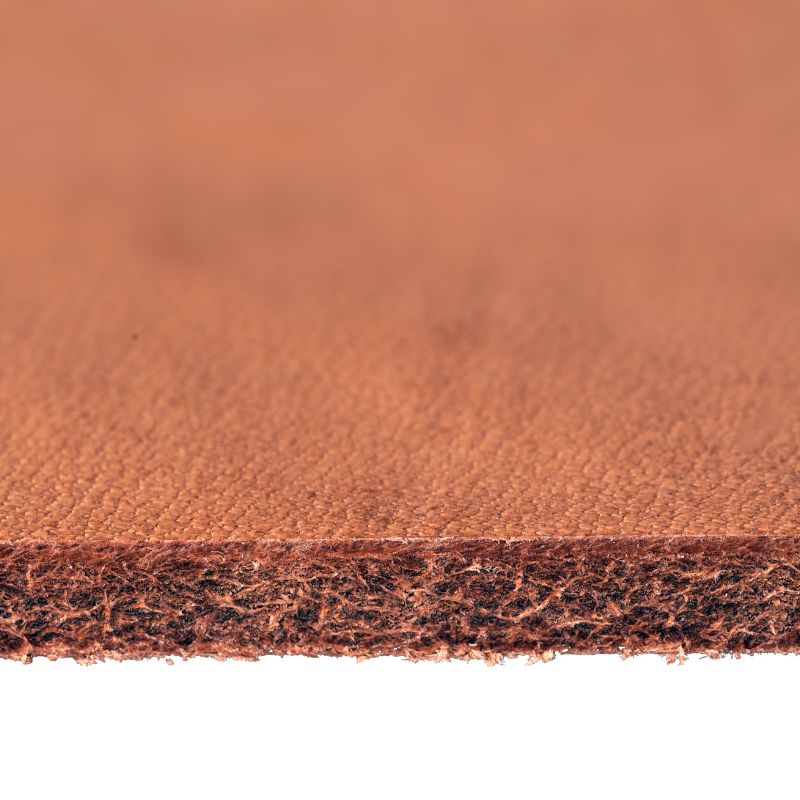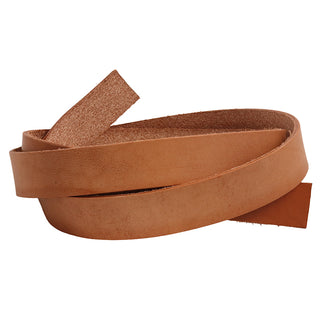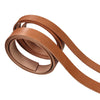
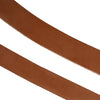
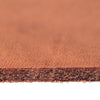
Leather half-back strap full grain natural vegetable tanned for leather goods
Half-back straps of Niagara natural vegtable tanned leather for your leather goods.
Features of saddle leather Niagara natural half-back strap:
The saddle leather Niagara is a 100% natural leather. It is a fullleather grain not pressed, not corrected, smooth grain and flesh. It is avegetable tanned leather and therefore a non-allergenic leather. The vegetable tannins give firmness and a strong resistance to elongation. It is fed in a tallow bath (a mixture of paraffin and beef fat), more commonly known as "tallow leather". This food makes it easier to cut and work with, as well as being more resistant to water. The tallow makes it possible to have a leather without maintenance because the fat is given in a constant way on the surface of the leather, giving it the necessary food and a patina of excellence. Thanks to this nourishment, the saddle leather Niagara has an advanced resistance in outdoor use, it will reject any external disturbance (water / salty environment). This saddle leather is therefore suitable for intensive wear.
Origin of Niagara natural half back leather strap :
Natural half-back straps Niagara are sourced fromselected beef and bullfarms in France, Germany, Spain and Italy. To ensure the quality of the leather used in production, a leather traceability process has been set up at Radermecker Tannery. The hides are marked 3 times with 3 identifiers at each stage: on receipt of the hides, enabling traceability of the origin of the hides; during the tanning process; during the finishing process.
Uses of Niagara natural half back leather strap :
Niagara leather strap with a natural half back can be used in leather goods, especially when you need long lengths of leather: belts, bag handles, bracelets, watch straps, collars for dogs and cats, etc. It is the most popular leather for making belts because of its natural finish, resistance to elongation and long life.
It can also be used for tack: halters, snaffles, harnesses, bridle reins, headpieces, uprights, headpieces, nosebands, Straps, throat lashes and girths.
As it has no dye, the natural Niagara half back leather strap can be dyed, especially with our aniline dyes available in Black, Chocolate, Havana, Cognac and Victoria.
Niagara saddle leather can be finished with our slice waxes available in Black, Chocolate, Havana, Cognac and Victoria.
Moulding and marking (hot and cold) can be done with Niagara saddle leather.
Embossing work on our Niagara leather is not recommended, as the leather will regain its natural thickness when fed in a grease bath, and the embossed patterns will fade over time. For embossing work on leather, we recommend our natural Pykara leather in shoulder, half shoulder, quarter shoulder and strap shoulder.
Dimensions and hide area of Niagara natural half back leather strap :
The half-back is made up of shoulder and butt. It's a half-hide with the sides removed. Its advantage is that it can be used for very long lengths, as in saddlery. We offer Niagara natural half-back strap in 4 dimensons:
- Length 180cm x Width 3cm
- Length 180cm x Width 4cm
- Length 220cm x Width 3cm
- Length 220cm x Width 4cm
In the "Guaranteed dimensions" tab above, you'll find an explanatory diagram of the " half-back strap" and the corresponding guaranteed dimensions.
Care instructions for Niagara natural half back leather strap :
For the care of saddle leather Niagara, thanks to the tallow bath feed, the fat is impregnated throughout the thickness of the saddle leather Niagara, so there is no need to feed over time. Food can be applied to the grain to ensure its greasy appearance or to accelerate the patina of the leather. This care of the grain will ensure a longer life. Our saddle leather Niagara will resist humidity. Just let it dry at room temperature and it will look great again. Because it is fed in a tallow bath (grease), a whitish film of paraffin build-up can form on temperature shocks. Simply rub it off.
Discover leather care tips from your tannery and 2 expert customers on the blog post "Leather Care".




